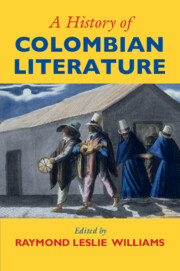Book contents
- Frontmatter
- Contents
- Notes on contributors
- Preface
- Introduction
- PART I LITERATURE AND SOCIETY IN COLOMBIA
- PART II COLOMBIAN CULTURE AND SOCIETY IN REGIONAL CONTEXTS
- PART III BEYOND THE BOUNDARIES
- 15 García Márquez as public intellectual
- 16 Women writers in Colombia
- 17 Colombian queer narrative
- 18 Extracting nature: toward an ecology of Colombian narrative
- 19 Visions of nature: Colombian literature and the environment from the colonial period to the nineteenth century
- 20 The intersections between poetry and fiction in two Colombian writers of the twentieth century: Álvaro Mutis and Darío Jaramillo Agudelo
- AFTERWORDS
- Index
- References
19 - Visions of nature: Colombian literature and the environment from the colonial period to the nineteenth century
from PART III - BEYOND THE BOUNDARIES
Published online by Cambridge University Press: 05 June 2016
- Frontmatter
- Contents
- Notes on contributors
- Preface
- Introduction
- PART I LITERATURE AND SOCIETY IN COLOMBIA
- PART II COLOMBIAN CULTURE AND SOCIETY IN REGIONAL CONTEXTS
- PART III BEYOND THE BOUNDARIES
- 15 García Márquez as public intellectual
- 16 Women writers in Colombia
- 17 Colombian queer narrative
- 18 Extracting nature: toward an ecology of Colombian narrative
- 19 Visions of nature: Colombian literature and the environment from the colonial period to the nineteenth century
- 20 The intersections between poetry and fiction in two Colombian writers of the twentieth century: Álvaro Mutis and Darío Jaramillo Agudelo
- AFTERWORDS
- Index
- References
Summary
Nature's challenges to humankind have not been limited to the struggle to wrest survival out of its often difficult conditions, develop culture, and build enduring civilizations. Humanity has struggled, too, to make sense of nature. To apprehend its vastness, its complex and ever-elusive quality, beggars the imagination and frustrates the intellect. For Heraclitus, ceaseless transformation, interconnectedness, and the joining of opposites make nature endlessly elusive, as one of his most oracular sentences has it: “Phusis kruptesthai philei” (Nature loves to hide).
For the writers who set about describing the natural environment of what is now Colombia (part of the colonial Nuevo Reino de Granada [New Kingdom of Granada] and the early-national Nueva Granada [New Granada]), the region – with its stunning multiplicity of landscapes, its fauna and flora, and the humanity it sustained – embodies the dense layers of meaning latent in the philosopher's aphorism. At times nature hides as an object to be revealed; at times nature conceals the complexity of the world itself. Their descriptions reveal a series of concerns that reflect shifting modes of reasoning used to put forward particular visions of the region. In the late sixteenth century, literary works of the Nuevo Reino de Granada reveal changing views of the cosmos and preoccupations about the relationship between man and world through their descriptions of nature and space. Illuminated by intellectual projects that reconceived how to think about nature, these views furnish us a key with which to unlock the shaping power these representations exercised on the debates over the nature of the human, the image of the Earth as object, and the critique of intervention. Later the deployment of a new, scientific discourse and the delineation of new territorial entities in the eighteenth century, aligned with Spain's desire of commercial expansion, lay the groundwork for a novel envisioning of New Granada that would ultimately influence the rhetorical discourse of independence. The subsequent engagement of the scientific language of the nineteenth century shaped Colombia's foundational literature by forging diverging natural images of national identity.
These shifting visions of nature also reveal a set of concerns shared with certain strands of modern ecological criticism. Authors turn to nature to interrogate the complexities of the world as known and to discover how the production of such knowledge came about.
- Type
- Chapter
- Information
- A History of Colombian Literature , pp. 406 - 430Publisher: Cambridge University PressPrint publication year: 2016
References
- 3
- Cited by



